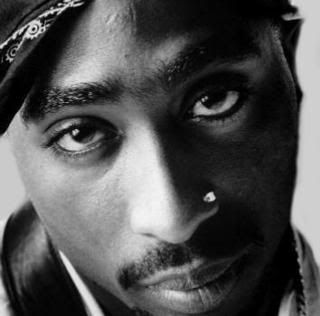
I had a conversation with a couple of people the other day about the importance of Tupac. Somebody told me that Tupac wasn't one of the most globally known, or internationally recognized Black people ever. Another person said that his music wasn't politically or socially relevant; that he wasn't as important to Black music as Bob Marley.
All of this is just a couple of weeks after Blender Magazine said Pac was the most overrated musician of all-time.
So is the world coming to the end? Was Tupac really not that important, then and now?
Tupac was the most important Hip-Hop artist ever. He was important not just for what he did, but for what he said.
Whether it is twelve years after he pasted away, or seven days after the anniversary of his death, we must never forget what Pac contributed to the world in his short time here.
With the amount of books, documentaries, and articles produced on Tupac's life, I never thought I'd be put in a position to have to defend Pac's importance to Black people. I thought the fact that scholars like Michael Eric Dyson and Mark Anthony Neal, and institutions like University of Cal-Berkeley, studied Tupac was enough to justify his significance. I figured the murals of him in Brazil, the respect for him in Cuba, and the people who asked me about him in South Africa was a testament to his global impact. Perhaps being studied in a college classroom isn't enough to show Pac's importance to American history. And maybe Brazil and Cuba don't show his global meaning.
Maybe time makes us forgetful.
But for those of us that love Hip-Hop, and believe in the struggle and glory of Black people in this world, we must always remember and celebrate how important what our prince did (and the message he brought) was to this world.
Tupac was the window to the soul of the first post-Black Power/Civil Rights generation. He is indicative of that generation in so many tangible and intangible ways.
His name shows his ties to the African Diasporic tradition: Pac was named after the Tupac Amaru, the leader of Peru's indigenous rebellion against the Spanish Empire's conquest of the Inca people. His mother (Afeni Shakur) and stepfather (Mutulu Shakur) were Black Panthers, and instilled in him a Black consciousness that showed him the history and power of his people. He enjoyed the best that America had to offer: Pac had a childhood education that allowed him to read Shakespeare, study Theater, and participate in the arts; he was well read, as evident by his reading and studing of political philosopher Niccolò Machiavelli's The Prince leading him to name his last recorded album The Don Killuminati: The 7 Day Theory. His music allowed him to reap the financial benefits our society offers.
Growing up without a father, raised by a mother battling a drug addiction, and living in Harlem, Baltimore, and Oakland, he also saw the dark side of his generation: Drugs, poverty, and broken homes.
Education. Success. Poverty. It's indicative of the struggle; the gift and the curse.
This story, this complexity, came out in the way Pac lived his life and in the music he produced. He wrote about how much he loved his mother despite her addiction (Dear Mama). He was misogynistic, sexist, and vulgar. He displayed sophistication and militancy in his music (Rebel of the Underground), while expressing charisma and intellect in his interviews. He crafted stories of urban Black life that was resonating for the time (Brenda's Got a Baby). He could uplift and inspire (Keep Ya Head Up). But most importantly, he wasn't afraid to be vulnerable (So Many Tears, Pain); Pac wasn't afraid to bear his soul as witness to the struggle and pride of being Black in America.
Author, educator, and artist Dax-Devlon Ross gives perhaps one of the most poignant testimonies to what Tupac meant in his book, "The Nightmare and the Dream: Nas, Jay-Z, and the History of Conflict in African-American Culture:"
"I was a 21 year-old college student the night 'Pac died. I wasn't a thug or a gangsta. I hadn't grown up in poverty. My parents hadn't marched with King. I'd never been to jail. I'd never been shot. I'd never sold drugs...Existentially, though, we were kindred spirits. He showed me that I didn't have to be the most intelligent or gifted person to bear my soul on the page...He let me know that it was ok to be vulnerable.
More than any other artist, Tupac explored the tensions stemming from our generation's desire, and in some senses demand, to 'keep it real.' Hip-hop was born and bred by those people and in those communities that were left behind; by the children and grandchildren of those who didn't make it to college and couldn't enter the middle class...For Tupac that cultural experience wasn't embedded in a single community, but in the soul of every community that knew poverty and the chaos it wrought."
It is all these things that endeared Tupac Shakur to a generation, to the public, and to people all over the world.
This is why the life of Tupac Shakur is so important.
Many of us know this; millions of people across the world know this. And that is exactly why we must continue to remember him, and never downplay his significant because he is that important to us...Until The End Of Time.
Michael Partis
www.michaelpartis.blogspot.com
myspace.com/hiphopthought
http://my.rawkus.com/profile/ForeThought
michaelpartis@gmail.com
